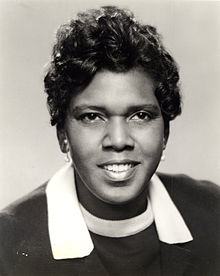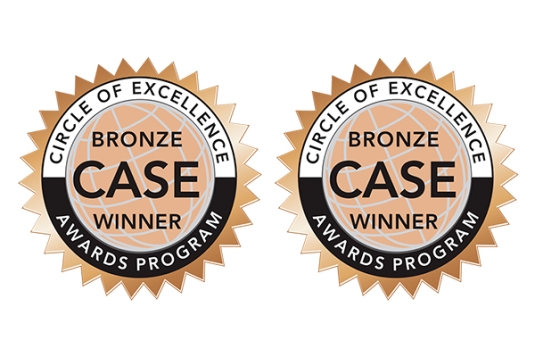As a distinguished author, public servant and educator, Professor Barbara Jordan has rendered a lifetime of outstanding service to the United States and to her fellow citizens. In unusually diverse and multiple fields of endeavor and in positions of extraordinary responsibility, Barbara Jordan, through her accomplishments in the national interest and manner of achievement, has exemplified the ideals of West Point as expressed in its motto, “DUTY, HONOR, COUNTRY.”
Barbara Jordan’s extraordinary journey from the segregated Houston neighborhood of her childhood to legendary figure on the national stage is replete with firsts. Deciding early in life to be something out of the ordinary, she honed her gift for public speaking in high school and later at Texas Southern University, where she won national recognition in competitive debate and oratory. After graduating magna cum laude, she enrolled in the Boston University School of Law.
Following graduation in 1959, she was admitted to the bar in both Massachusetts and Texas. Choosing to return to her native state, she opened her private practice in Houston. In 1965, Barbara Jordan ran for the Texas Senate and won with a two-to-one majority—the first African-American woman ever elected to that body. An astute student of Texas legislative procedure, her performance was so effective that her thirty white male colleagues named her outstanding freshman senator during her first year in office. In 1972, she was elected president pro tem of the Senate and when appointed Texas governor for a day, became the first African-American governor in our nation’s history.
Barbara Jordan was elected to the United States House of Representatives in 1972 and again was a trailblazer—the first African-American woman to be elected from the Deep South. During her three terms in office, she served on the Government Operations and Judiciary Committees and was instrumental in the passage of key voting and civil rights legislation.
As a member of the Judiciary Committee, she participated in the nationally televised impeachment proceedings of former President Nixon. In her opening testimony to the committee, she strode boldly into the consciousness of the nation with these now-famous words: “My faith in the Constitution is whole. It is complete. It is total. I am not going to sit here and be an idle spectator to the diminution, the subversion, the destruction of the Constitution.”
In 1977, Barbara Jordan announced that she would not seek a fourth term in Congress. A year after leaving office, she entered the field of higher education, accepting the Lyndon B. Johnson Public Service Professorship at the LBJ School of Public Affairs, the University of Texas. In 1982, she was selected to hold the Lyndon B. Johnson Centennial Chair in National Policy at the LBJ School of Public Affairs. As an educator, she has become legendary. Her courses are so oversubscribed that attending students are chosen by lottery. Although no longer in government, she continues to serve our nation—most recently as the Chair of the United States Immigration Reform Commission.
Barbara Jordan serves as a board member of six major corporations. She is the recipient of more than thirty honorary degrees. She has received numerous national awards including designation as “Best Living Orator,” induction into the National Women’s Hall of Fame, and most notably, the Presidential Medal of Freedom.
Throughout her long and dedicated service to our country, both in and out of government, Barbara Jordan has made a lasting contribution to the welfare of others and to the articulation of the ethical foundations of American government. Through the eloquence of her oratory, her relentless pursuit of equal justice under law, and her unswerving dedication to principle, she has left an indelible imprint upon generations of Americans. Accordingly, the Association of Graduates of the United States Military Academy hereby awards the 1995 Sylvanus Thayer Award to Professor Barbara Jordan.
Edward C. Meyer
General, USA (Retired)
Chairman, Association of Graduates
Speech
Remarks by Barbara Jordan
Upon receiving the Sylvnaus Thayer Award
West Point – October 5, 1995
To be chosen to receive the Sylvanus Thayer award is a personal tribute of high and unmatched quality. This single event places me among a group of distinguished Americans you believe best embodies the core principles of West Point. Duty. Honor. Country. My unequivocal delight is enhanced by your presence. Your decision to attend this institution was not a trivial one. You had to discard unnecessary irrelevancies and distracting engagements and commit yourselves to a path designed to add distinction to your country.
I believe I am looking at an audience that includes future Thayer Award winners. By your desire to come to this place, by your admittance through a rigorous screening process and by your work while here, you have already shown that you are the resource from which leaders will emerge.
I know it must be difficult being a cadet. And I know as you sit here, with part of your attention focused on me and another part focused on the obligations of your cadet life you are perhaps thinking that I am guilty of great understatement. Of course it is difficult being a cadet!
I know through conversations with some of your predecessors and through anecdotes that filter through the press and other media—some true, some perhaps exaggerated—that yours is an education unlike any other. Demands are placed on you that cause shudders in most of your peers around the nation. It is difficult, as you try to live up to your own standards and those of the school, to consider the very important philosophical context of a West Point education.
But it is important to take the time to examine your purpose and to understand that you are not here simply to get a degree. You could have done that anywhere. You are not here just to go through the motions and endure these West Point rites of passage.
Duty. Honor. Country. What a marvelous resonance those words have. Indeed, hallowed words, as Douglas MacArthur called them in 1962. It is not just the sound of their syllables placed together that gives them resonance. It is their historical context. It is the assumptions that undergird those three words.
Duty. Honor. Country. A host of tested and proven values are cast together in those six syllables.
Can you do what is necessary through your service to your country to give those words a meaning that will not only suffice, but challenge and lead others in the 21st century?
You must understand those words in order to allow your life to fulfill their meaning in-depth and to expand that meaning through the service rendered.
A biographer of the Duke of Marlborough, writing in 1894, said that “in England, the noble, selfless word duty has long been the motto of her famous warrior sons.”
A noble, selfless word. We should understand duty in the context of a noble, selfless word rather than as simply something that has to be done. Dwight Eisenhower, who preceded me on this stage by 34 years, was a student of the concept of duty. “No man can always be right,” he wrote. “So the struggle is to do one’s best; to keep the brain and conscience clear; never to be swayed by unworthy motives and inconsequential reasons, but to strive to unearth the basic factors involved and then to do one’s duty.”
In the one-hundred and ninety-three years of this institution, our famous warrior sons and daughters have come from West Point. These men and women who helped set your standards have led us in war and in peace. What set them apart from all others?
Is it not the ability and the courage to deny one’s self? The ability to remain unswayed by unworthy motives and inconsequential reasons?
Why are you here? I believe for one purpose that transcends all others. To serve your country. You made a decision with monumental consequences when you entered the United States Military Academy.
If I were to look each of you in the eyes and ask why you came to West Point, I think you would agree that not every honest answer would place service of country at the top of the list. Some of you have more practical reasons for being here. Perhaps it was parental pressure. Perhaps it was the realization that you could not afford this level of education at any other school. Perhaps it was the desire to become the world’s premier engineer.
Nothing is wrong with personal motivation. Nothing is wrong with understanding the worth of a West Point education. Certainly nothing is wrong with a desire to be the best. The key to your success at this institution, however, will be your ability to mature your personal motivation into a selfless motivation. The rewards for both you and the country will be far greater.
Those of you who accomplish great things in service to your country will be those who learn the meaning of denial of self.
Those of you who will accomplish great things will achieve the elevation of character that constitutes honor.
Among the world’s great writers at the time of West Point’s founding were William Wordsworth and Samuel Taylor Coleridge. Each wrote about honor in the same context in which we are considering Duty, Honor and Country tonight. Coleridge said that honor implies “a reverence for the invisible and supersensual in our nature.” Again, a denial of self. Wordsworth said that honor “tis the finest sense of justice that the human mind can frame.”
You will be the decision makers of the future. You will literally hold the lives and fortunes of others within your power. It is my hope that your circumstances will not include warfare, but they very well may. If you do not develop honor, if you do not embrace the finest sense of justice that the human mind can frame, you will not be worthy of the confidence West Point and your country will place in you.
How many times since you first stepped on this campus have you heard words to the effect that the role of the military is changing radically in these post-Cold War years? I hope you do not become numb to the meaning of the changing military role. Instead, take those words as compliments. For if your role were not changing, if you were not willing to change and shape change, then I suggest that you would not be of West Point caliber.
Some things do not change. High ethical values inspirited by your principles. Duty. Honor. Country. They do not change.
Your mission statement should be a constant inspiration to you. “Each graduate shall have the attributes essential to professional growth throughout a career as an officer of the regular Army,” it reads in part. Growth means change. Do not fear change. Embrace it as part of your mission.
I am aware that tradition is important here. You are still being taught by some of the methods established by Sylvanus Thayer in the 1820s. Do not mistake adherence to successful tradition for a fear of change. One of your predecessors told me of the standing joke that West Point represents 193 years of tradition unhampered by progress.
If tradition means a steadfast adherence to the highest ethical standards; if tradition means an unfailing dedication to your duty; if tradition means leadership with character; then let this tradition continue for the next 193 years.
If you practice the highest ethical standards, if you are dedicated to your duty, and if you lead with character as Sylvanus Thayer taught, you will then be able to embrace change without fear. Tradition and change are not antithetical. If you look at those you have honored before me, you will see the embodiment of the weaving of tradition and the ability to embrace change.
By enrolling in, and by now I hope embracing the West Point tradition, you have accepted a lifetime of public service. You will be held—you should be held—to higher ethical standards than anyone else. By accepting a lifetime of public service you have also accepted the public trust.
For 193 years, that public trust has been well-placed. West Point is where leadership is born. West Point is not just famous names. It is men and women who achieve great things. It is people who built the east-west railroads, people who built the Panama Canal, people who have gone to the Moon.
One hundred and ninety-three years ago we had just begun this grand experiment called democracy. We were not a mature nation. We were just beginning to define our character and find our footing as a country. Here—at West Point—the seeds were planted. The men and women of West Point watered our native soil. We have grown and excelled as a nation in no small part because of the work of your West Point family tree.
Of course, you should not expect that by attending West Point or being graduated from here that you will automatically achieve some form of immortality. Not every graduate does. Just as at every great educational institution, West Point has seen its share of graduates who have not lived up to the principles of Duty, Honor and Country. No system is perfect. After all, we are human. We have weaknesses and fears and misfortune.
There is no magic formula to guarantee success. I can assure you that if you embrace your West Point heritage . . . if you go beyond the dictionary definitions of Duty, Honor, Country and learn their meanings … if these words are inculcated into your very souls and are not just everyday chatter … you will not need magic formulas.
Your West Point education is only the beginning. But a marvelous beginning. If the idea of service before self becomes ingrained in you—as West Point will give it every opportunity—you will leave here with the necessary tools to lead our country in the 21st century.
You will do so with honor.
Thank you and good luck.




